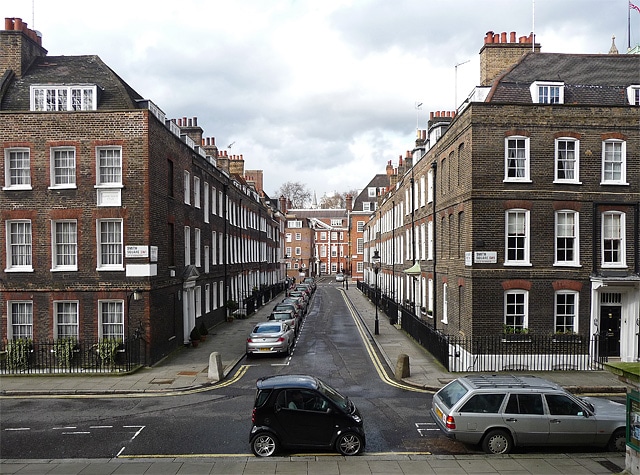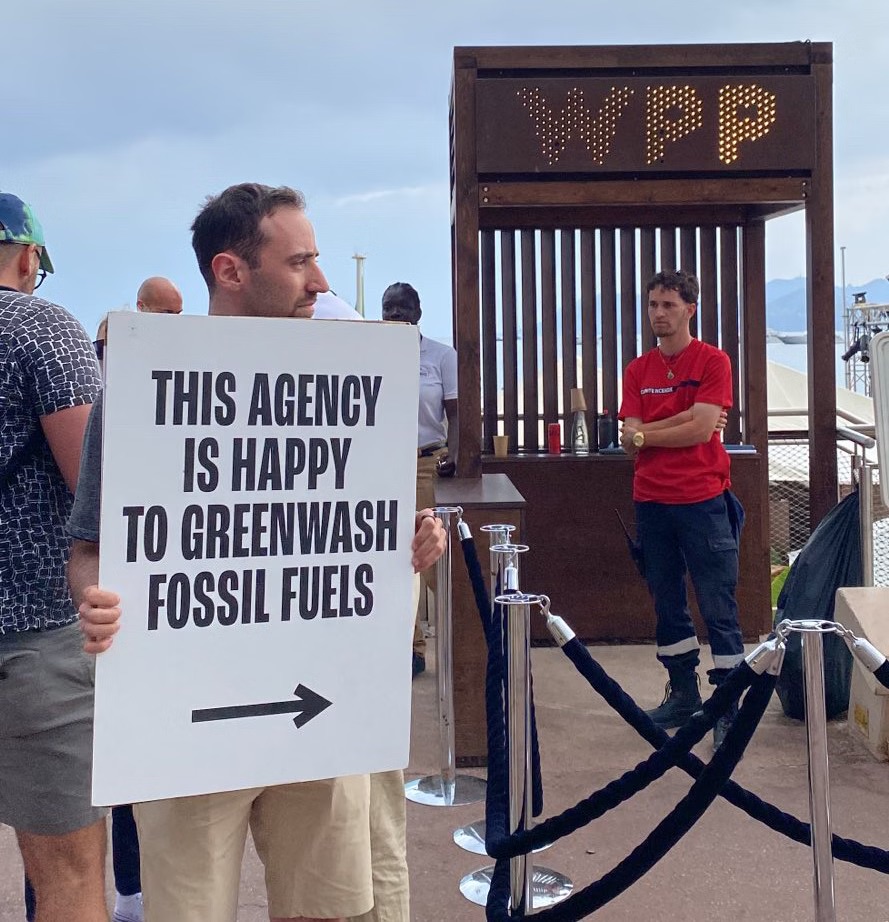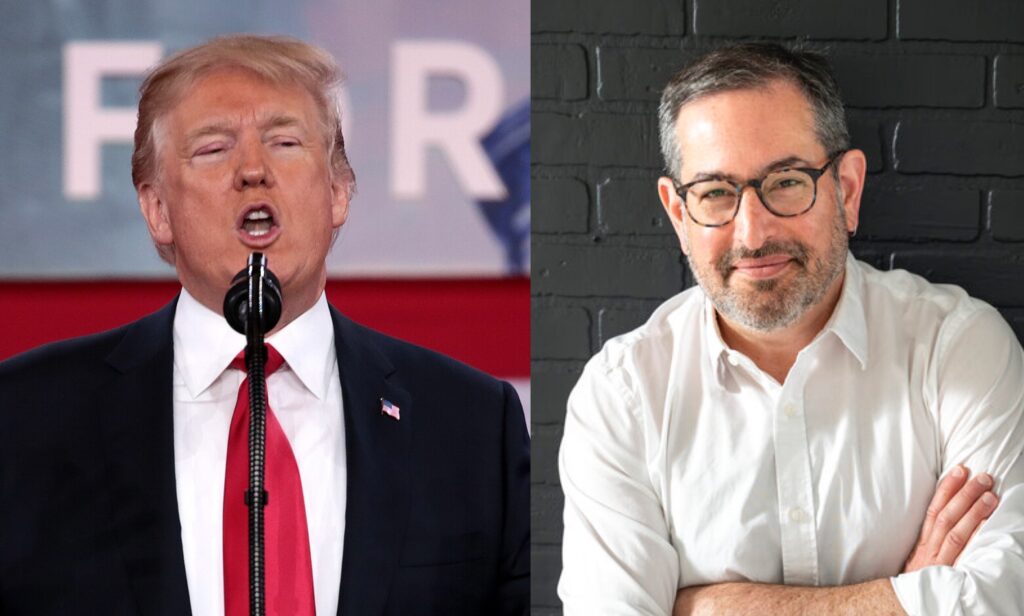The DeSmog UK epic history series investigates how Thatcherite John Blundell challenged the young Roger Bate to set up an Environment Unit within free-market think tank the Institute of Economic Affairs.
Future historians interested in establishing how Britain became a chief cheerleader of scepticism only 30 years after Thatcher led the world on climate change science and policy will have to begin on the morning of 1 January 1993.
It all began at the offices of the free-market think tank the Institute of Economic Affairs (IEA) in Lord North Street (pictured). Here, historians will discover that it was John Blundell, a diehard Thatcherite and the IEA’s new director general, who undid this part of Thatcher’s legacy.
Almost as soon as he arrived in Westminster to head up the IEA, Blundell called the young, erudite Roger Bate into his new office and “challenged” him to establish a new Environment Unit within the institute.
The IEA would form a specialist department to bring together economists, philosophers and other academics to better analyse and offer a counterweight to environmentalism. The initiative was inspired by founder of the Koch-funded Competitive Enterprise Institute (CEI) Fred Smith‘s work in the United States.
New Ideas
Blundell was keen to introduce new ideas and methods during his first 100 days as director general. But he also had a profound and instinctive desire to challenge the ever-growing popularity of environmentalism, which he assumed to be merely a new mask for communism.
“Socialism survives, however, by transmuting itself into new forms,” he wrote some years later. “State-run enterprises are now frowned upon, but the ever-expanding volume of regulation – financial, environmental, health and safety – serves to empower the state by other means.”
Blundell strongly believed that environmentalists were “not remotely interested in improvement.” He wrote: “The idea of a new, improved, kinder, gentler capitalism is utterly alien to them.”
“They want to tear it down and destroy it…the ‘environmental movement’ is simply a means to an end, the outright destruction of business, the total demise of capitalism…appeasement has never and will never work.”
‘Reasonable’ reports
As Blundell’s new recruit, Bate began planning a major conference in London that would be attended by academics and leaders from British businesses about to be strangled by environmental regulations.
His work with Smith was also used as the basis for a new publication attacking the science of climate change by strongly emphasising any uncertainties. He knew exactly the right person to help produce a professional and reasonable-sounding polemic: Julian Morris.
Morris completed a masters in Environment and Resource Economics at University College London (UCL) before going to Cambridge University to study a Masters in Philosophy in Land Economics. He said: “I attended one or two IEA lectures while I was at UCL and met John after one of those.”
“Roger asked me to co-author a paper on global warming with him in late 1993. I was working as an econometrician in Frankfurt when I wrote my sections of that paper. I was subsequently commissioned by the IEA to write a paper on desertification. While I was writing that paper, I was hired by the IEA as a research fellow.”
Mark Pennington, a young academic who reacted strongly against the teaching of Marx at university, would also write reports for the think tank.
A member of the IEA’s academic advisory board, Pennington recalled: “[Blundell] felt that in the US there were some organisations or some of the think tanks in the US like the Cato Institute and the CEI who had a previous record of exposing what they saw to be junk science….and there wasn’t anything similar in the UK, and therefore the Environment Unit could play some role in that.”
Inform the Public
Bate was also responsible for raising cash for this new unit. He sent the programme for his new outfit to his friends at the tobacco company Philip Morris.
“We aim to bring balance to the often highly politicised discussion and, most important, to inform opinion leaders and the general public,” it read.
The unit would publish and hold public events attacking government intervention relating to “recycling, eco-labelling, land use regulations, private wildlife conservation, water and air pollution, transport policy, desertification, population and environmental education”.
The Environment Unit, sounding almost like a public relations company, boasted that “its research and authors have been featured in all of London’s major newspapers and have received international coverage.”
At first, the IEA listed its donors in the briefings sent to potential future funders; although these were not made public. These donors included British Petroleum (BP), the Esso oil company and the US-based Earhart Foundation.
Sceptic Risk
Richard Ritchie, a parliamentary lobbyist and advisor to BP, was in close consultation with Blundell during the earliest days of the environment movement. He recalls that oil companies, even at this early stage in the debate, were in fact reluctant to support a climate sceptic outfit, concerned at the risk to their finely tuned public relations campaigns.
Blundell was shocked after working for Koch in America that the oil corporations would not come out fighting against the green lobby and for free-market capitalism.
Ritchie told me: “He couldn’t understand why oil companies weren’t prepared much more openly to support the IEA on this issue. Exxon challenged the science of climate change.”
“Now actually, I personally and BP corporately were never quite sure whether that was the right thing to do and there were various aspects of this. Firstly, I felt that BP challenging the science of climate change was rather like a tobacco company challenging the science of cancer – even if we were right, people wouldn’t listen to you.”
He added: “I didn’t feel that the IEA had any expertise on the science. They were perfectly entitled to draw attention to the fact that there was a scientific debate but I don’t think that they had any sort of intellectual heritage for saying the science is wrong.”
“I kept saying to John Blundell and I said it to Roger and all the rest I said look, why don’t you concentrate on the fact that there is a free market response to climate change if it is happening?”
“Rather than deny that it’s happening … what really worried me about the climate change debate, and still does, was that it became the left-wing economic, left-wing economists who’d lost the battle over price and income controls had lost the battle over regulation saw this as a way of starting the battle again.”
“It was their excuse for regulation, their excuse for price controls, their excuse for new taxes. And that’s exactly what’s happened.”
Science vs Economics
A serious split started to emerge within the IEA on the issue of climate change with the trustees themselves divided about whether the Environment Unit should attack the science or instead admit there was a problem emerging and devise free-market solutions.
Pennington thought the science of climate change was reliable: “There was always an internal debate on the advisory committee about the extent to which the IEA should be questioning the science. Wasn’t the best thing to say, let’s accept that climate change is happening and that it may have a human component and therefore to say what would a market based approach recommend?”
“There was always a bit of tension [between] people who thought this was the most appropriate route and the overview which was that some of the science in the area was being politically motivated, was being politically manipulated. I know Julian Morris was quite keen on that sort of approach.”
He added: “I’m not sure there is a market solution, I am not sure that there’s any solution to climate change, that was my personal view.”
Oil Funding
Linda Whetstone, Antony Fisher’s daughter and IEA trustee, on the other hand, believed they should challenge the science but confirmed they were seriously concerned that if the public were to discover that the IEA was funded by oil while pumping out the main sceptic publications available in Britain, it could damage their reputation.
Whetstone is adamant that the money was not the motive: “It doesn’t matter whether it’s climate change or anything else, we basically don’t think governments are the solution to a lot of these problems, all we think that there are other better solutions”.
She added: “There were a time when if you dared challenge climate science some people treated you as if you were an absolute pariah, whereas now I think those who do challenge its effects are regarded well, they’re listened to.”
Blundell was just about able to carry his trustees with him, and the Environment Unit set about the task of spreading the sceptic gospel across Britain with verve and gusto.
Up next in the DeSmog UK history series, Bill Clinton’s election as President of the United States heralded a new climate era but would also see oil-funded lobbyists increasing their attacks on the IPCC.
@brendanmontague
Photo: Stephen Richards via Creative Commons
Subscribe to our newsletter
Stay up to date with DeSmog news and alerts







